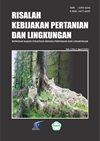KEBIJAKAN PERUBAHAN FUNGSI PARSIAL HUTAN LINDUNG (STUDI KASUS DI KABUPATEN TORAJA UTARA)
Abstrak
Perubahan fungsi kawasan hutan lindung bertujuan mengoptimalkan fungsi kawasan hutan. Perubahan fungsi hutan lindung di Kabupaten Toraja Utara mengalami keterlambatan karena adanya pandangan yang berbeda antara Direktorat Jenderal Planologi Kehutanan dan Direktorat Jenderal Perlindungan Hutan dan Konservasi Alam. Tujuan penelitian ini adalah menggali wacana yang mendasari antara Ditjen Planologi Kehutanan dan Ditjen PHKA yang memunculkan narasi terhadap kebijakan perubahan fungsi, memunculkan aktor/jaringan dan kepentingan/politik yang menyebabkan proses perubahan fungsi berjalan lambat. Proses yang mengalami keterlambatan dilihat dari sudut wacana, aktor dan kepentingan sehingga dapat digunakan pendekatan kerangka IDS 2006. Aktor yang terlibat dalam proses perubahan fungsi hutan lindung memiliki kepentingan dan pengaruh yang berbeda sehingga perubahan fungsi hutan lindung akan sulit dilakukan. Oleh karena itu perlu mengambil kebijakan yang mempertimbangkan persamaan wacana dengan kepentingan yang sama dan dukungan aktor yang mempunyai visi yang sama.##plugins.generic.paperbuzz.metrics##
Unduh
PUBLICATION ETHICS
Jurnal Risalah Kebijakan Pembangunan Pertanian dan Lingkungan (JRKPL) is a peer-reviewed journal publishing original research to develop a coherent and respected network of landscape architecture knowledge. JRKPL committed to upholding the highest standards of publication ethics that clarifies ethical behavior of all parties involved in publishing a scientific article in JRKPL.
As publisher of JRKPL, PSP3-LPPM IPB and PERHEPI takes its duties of guardianship all stages of publishing process and we recognize our ethical and other responsibilities.
Duties of Authors
An author should not publish manuscripts describing essentially the same research in more than one journal or primary publication. Submitting the same manuscript to more than one journal is unacceptable and constitutes unethical publishing behavior. In general, an author should not submit for consideration in another journal a previously published paper.
Authorship should be limited to those who have made a significant contribution to the manuscript and should be listed as co-authors. Where there are others who have participated in certain substantive aspects of the research project, they should be acknowledged as contributors. The corresponding author should ensure that all co-authors have seen and approved the final version of the paper and have agreed to its submission for publication.
The authors should ensure that they have written entirely original works, and if the authors have used the work and/or words of others, that this has been appropriately cited or quoted. Plagiarism are include passing off another paper as the author own paper, copying or paraphrasing substantial parts of another paper (without attribution) and claiming results from research conducted by others. Plagiarism constitutes unethical publishing behavior and is unacceptable. Plagiarism detected works will be banned for further publication procedure.
The authors acknowledge that they have disclosed all and any actual or potential conflicts of interest with their work or partial benefits associated with it. All sources of financial support for the project should be disclosed. Potential conflicts of interest should be disclosed at the earliest stage possible.
Duties of the Editorial Board
Review Process
JRKPL is committed to objective and fair double-blind peer-review to prevent any actual or potential conflict of interests between the editorial and review personnel and the reviewed material. JRKPL chooses reviewers based on their expertise (whose most closely matches the topic of the paper). At least 2 reviewers are invited to evaluate a manuscript. In cases of controversy or disagreement regarding the merits of the work, an additional review will be solicited. The JRKPL editor mediates all interaction between authors and reviewers, and the review results owned by JRKPL.
Publication Decisions
The editor of a peer-reviewed JRKPL is responsible for deciding which of the articles submitted to the journal should be published. The validation of the work in question and its importance to researchers and readers must always drive such decisions. The final decision on article acceptance based on reviewer's opinions, suggestions, and comments. The editor may confer with other editors or reviewers in making this decision.
Fair Play
JRKPL evaluates manuscripts only based on the intellectual content. No race, gender, sexual orientation, religious belief, ethnic origin, citizenship, or political philosophies of the authors are considered in the evaluation process.
Confidentiality
JRKPL assure the confidentially of the manuscripts, actors, and other related information on the publishing process. Only corresponding author, reviewers, potential reviewers, other editorial advisers, and the publisher are allows for the information.
Disclosure
Unpublished materials disclosed in a submitted manuscript must not be used in an editor's own research without the express written consent of the author. Privileged information or ideas obtained through peer review must be kept confidential and not used for personal advantage.
Duties of reviewers
(1) Objectivity: Reviewer should provide written and unbiased feedback to the authors, personal criticism of the author is inappropriate. Reviewer comments should be clearly with supporting arguments indicating whether the writing is concise and relevant
(2) Expertise: Reviewer who feels unqualified to review the research reported in a manuscript or knows that its prompt review will be impossible should notify the editor and excuse himself from the review process.
(3) Acknowledgement of sources: Reviewer suggest relevant published work that has not been cited by the authors to improve the quality of the manuscript,
(4) Confidentiality: Reviewer should maintain the confidentiality of the review process. Privileged information or ideas obtained through peer review must be kept confidential and not used for personal advantage.
(5) Disclosure and conflict of interest: Unpublished materials disclosed in a submitted manuscript must not be used in a reviewer own research without the express written consent of the author. Reviewers should not consider manuscripts in which they have conflicts of interest resulting from competitive, collaborative, or other relationships or connections with any of the authors, companies, or institutions connected to the papers.



















